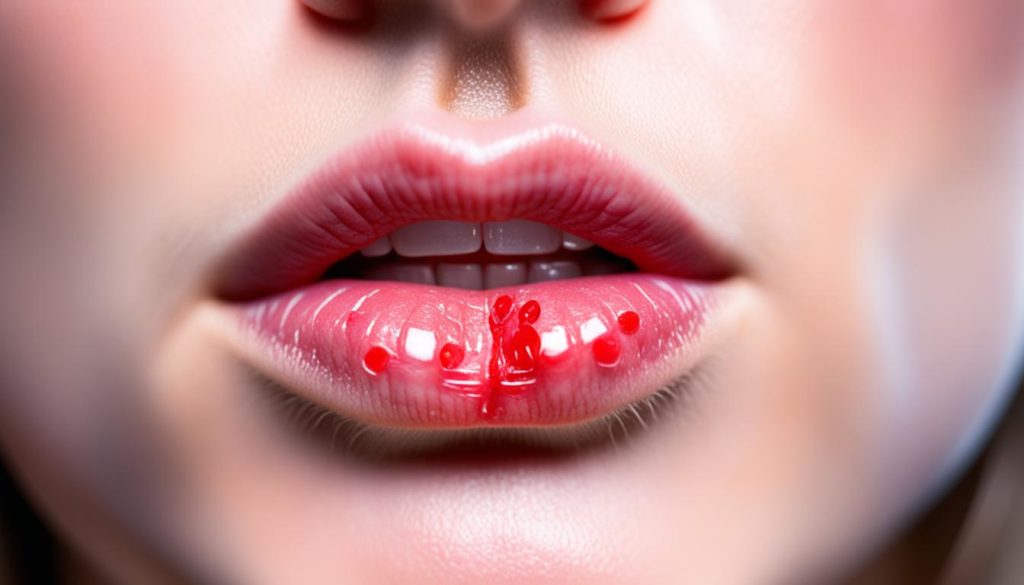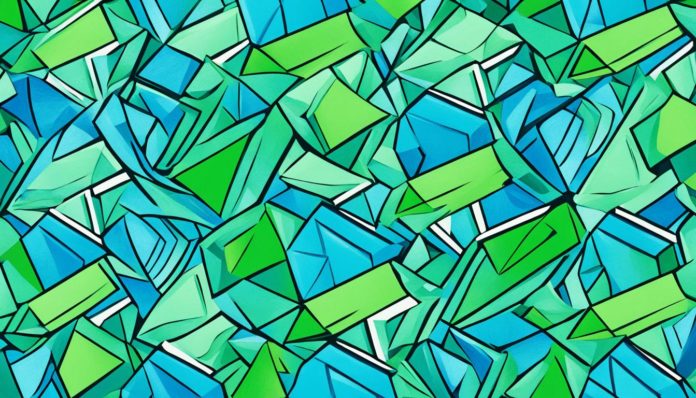Did you know over half of Americans carry herpes simplex virus type 1 (HSV-1)? This virus is the main cause of cold sores. It’s a big deal because it affects so many people. Cold sores, or fever blisters, pop up when you least expect them. They bring discomfort and worry to lots of folks. It’s important to know why they happen, how to treat them, and how to avoid them.
We’re going to look into where cold sores come from, what makes them flare up, and how to fight them. Whether it’s your first time dealing with an outbreak or you’re trying to avoid more in the future, you’ll find helpful tips here. This guide is full of steps to take to manage cold sores better.
Key Takeaways
- Cold sores are primarily caused by the herpes simplex virus type 1 (HSV-1).
- More than half of the American population carries HSV-1.
- Recognizing the early signs of cold sores can help in managing outbreaks effectively.
- There are various treatment options, including over-the-counter and prescription medications.
- Preventive measures can significantly reduce the frequency and severity of cold sores.
What Are Cold Sores?
Cold sores, known too as fever blisters, are tiny, fluid-filled lesions. They usually pop up on or around the lips. Yet, they can also show up on other face parts and inside the mouth.
These sores stem from the herpes simplex virus type 1 (HSV-1). This virus is highly contagious, spreading through direct contact with saliva or skin of someone infected.
Cold sores show up as clusters of red, inflamed blisters. They’re a sign of oral herpes. They can hurt and may feel like burning or itching before they’re even seen.

Cold sores are unique because of how they look and their cause, oral herpes. Other sores might come from injury or allergies. But cold sores come back because of the HSV-1 virus.
Knowing about cold sores helps you manage them better. It helps stop oral herpes from spreading. Plus, it eases the pain these sores bring. Learning about them is the first step to prevention and treatment.
Cold Sore Causes
Understanding cold sore causes is key to managing them. They mostly come from the herpes simplex virus type 1 (HSV-1). Let’s look into what specifically causes and triggers them.
Oral Herpes (HSV-1)
HSV-1, or herpes simplex virus type 1, mainly causes cold sores. It spreads through close contact, like kissing or sharing utensils. HSV-1 Transmission often happens this way. Once it’s in the body, it hides in nerve cells and can flare up, causing more sores.
Being near someone’s saliva or skin, especially if they have an outbreak, is risky. Avoiding this and knowing how the virus works can help prevent getting cold sores.

Triggers for Outbreaks
Several factors can wake up HSV-1, leading to a cold sore. Knowing these triggers helps in controlling outbreaks.
- Stress: Stress can weaken our immune system, allowing the virus to break out.
- Illness: Getting sick with something like the flu can also lead to cold sores.
- Sun Exposure: Sunlight can trigger cold sore flare-ups too.
- Fatigue: Being very tired can lower our defenses against the virus.
To lower the chances of an outbreak, take care. Use lip balm with sunscreen, relax to manage stress, and keep your immune system strong. These steps can help lessen the chances of cold sores coming back.
Common Cold Sore Symptoms
Knowing how cold sores show up can help catch them early and treat them in time. Spotting symptoms soon lets us manage them better and find relief faster.
Early Signs and Symptoms
Spotting cold sores early matters a lot. The first signs usually are tingling, itching, or soreness near the lips or mouth. These feelings mark the start of a cold sore outbreak. It’s crucial to notice these signs early.
Doing so means treatments like antivirals work better. This early stage is prime time for intervention.
Stages of Cold Sores
The cold sore journey follows certain stages:
- Tingling and Itching: These first symptoms mean early treatment can help stop the cold sores from worsening.
- Blister Formation: Soon, small blisters filled with fluid show up, causing pain and discomfort.
- Ulceration: When these blisters pop, shallow open sores form. This part is very painful and contagious.
- Crusting: The sores begin to dry out and form a crust. This is when healing starts.
- Healing: Underneath the scabs, new skin forms. Eventually, the scabs fall off, ending the cycle.
Knowing these stages well helps in noticing cold sores early. Early action is key for best management. It shows why watching for the first signs is so important.
Diagnosing Cold Sores
Finding out if you have cold sores is key to treating them right. Most doctors can identify cold sores using special steps. These are based on what symptoms you have.
Visual Examination
A doctor can often tell it’s a cold sore just by looking. If you have blister-like sores near your lips or mouth, that’s a big clue. Sometimes, though, they might need to do more tests to be sure.
Laboratory Tests
If looking isn’t enough, lab tests can help. Tests like PCR and antibody checks find the herpes virus. This makes sure the diagnosis is correct.
Effective Cold Sore Treatments
Cold sores are both painful and a nuisance. Luckily, there are many ways to ease the pain and speed healing. You can choose from over-the-counter meds or go for a prescription if needed.
Over-the-Counter Medications
There are many first steps to treat cold sores right at home. Creams and ointments like Abreva help a lot if used early. Pills like ibuprofen or acetaminophen also ease the pain.
- Topical creams (e.g., docosanol)
- Oral pain relievers (e.g., ibuprofen, acetaminophen)
Prescription Treatments
Sometimes, cold sores get tough and you need stronger meds. Antiviral drugs like acyclovir and valacyclovir can make cold sores better faster. You have to see a doctor to get these.
“Antiviral medications have revolutionized the management of cold sores, significantly reducing symptoms and promoting faster healing,” says Dr. Jeffrey S. Dover, a dermatologist.
| Treatment Type | Examples | Effectiveness |
|---|---|---|
| Over-the-Counter Medications | Docosanol, Ibuprofen | Moderate |
| Prescription Treatments | Acyclovir, Valacyclovir | High |
Knowing your options for cold sore treatments can really help make outbreaks easier. Always talk to a doctor to find what works best for you.
Home Remedies for Cold Sores
Many people look for natural ways to ease cold sore discomfort and heal faster. Home remedies can be a good addition to regular treatments, and some have scientific backing. One common method is using ice on the sore spot. Ice can lessen swelling and ease the pain for a while.
Lemon balm is another good option for cold sores. It’s a plant with antiviral qualities that can shorten and ease outbreaks. Putting lemon balm cream directly on the cold sore can stop the virus from spreading and help it heal quicker. Studies confirm that using lemon balm regularly improves symptoms.
Tea tree oil is beloved for its ability to fight viruses and reduce inflammation. To avoid skin issues, mix tea tree oil with a carrier oil before applying it to the sore. Using tea tree oil carefully can calm irritation and decrease swelling. These home remedies can offer extra relief and make dealing with cold sores easier.
FAQ
What causes cold sores?
Cold sores come from the herpes simplex virus type 1 (HSV-1). You can catch the virus through close personal contact like kissing. It can also spread by sharing items such as toothbrushes, razors, or towels with someone who has the virus.
How can I prevent cold sores from forming?
To avoid cold sores, try not to get too much sun and stay away from stress and sickness. Putting sunscreen on your lips, staying healthy, and not touching people with cold sores can also reduce your chances of getting them.
What are the early signs and symptoms of cold sores?
The first signs of cold sores can be a tingling or burning feeling around your lips or mouth. This can happen before the small blisters show up. Knowing these early signs helps you start treatment early, which might stop the sores from getting worse.
How do medical professionals diagnose cold sores?
Doctors usually know you have cold sores just by looking at them. If they’re not sure, they can do tests like the polymerase chain reaction (PCR) or antibody tests to check for HSV-1.
What are the most effective treatments for cold sores?
The best treatments for cold sores are over-the-counter creams, oral drugs, and prescription medicines. Medications like acyclovir, valacyclovir, and famciclovir can make your cold sores less severe and last for a shorter time.
Can home remedies help treat cold sores?
For sure! Home remedies like applying ice, using lemon balm, and tea tree oil can soothe cold sore symptoms. These natural treatments work best when used with other conventional treatments.
What are the common triggers for cold sore outbreaks?
Things like stress, getting sick, being tired, hormone changes, and sun exposure can all trigger cold sores. If you know what triggers yours, you can try to avoid these things and have fewer outbreaks.
Are cold sores and fever blisters the same thing?
Yes, they are the same. Both are caused by the herpes simplex virus type 1 (HSV-1) and show up as painful blisters around your lips, mouth, or nose.
How long do cold sores typically last?
Cold sores usually heal in 7 to 10 days. However, how severe they are and how you treat them can change how long they stick around. Starting treatment as soon as you notice signs can help them clear up faster.
Is HSV-1 the only type of virus that causes cold sores?
While HSV-1 is the usual culprit, herpes simplex virus type 2 (HSV-2), often linked to genital herpes, can cause cold sores too. This happens through oral-genital contact.


